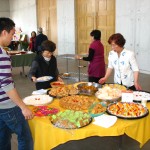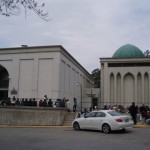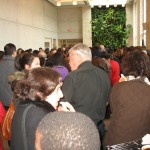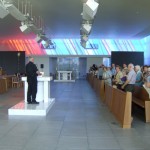Our short gospel describes the busyness of Jesus’ life. He is in his town of Capernaum and he is swamped by the men and women who want to listen to what he has to say and bring their wounded lives to his healing touch. Even a quiet meal in Peter’s home requires Jesus ministry to Peter’s mother in law. After a short sleep Jesus slips away for a bit of privacy and prayer and this too is interrupted. Peter intrudes into Jesus’ peace and quiet with the message,’ everyone is searching for you – everyone wants more of you. But Jesus lets Peter know he has to be moving on, he words and healing are not just for the men and women of CA Parham, he must go to the neighbouring town with his message, for this is what he came to do. Jesus was compelled to go out to all the towns and villages and share his message of God’s great love for the least and the lost. The men and women of Carp haram we impressed and excited by his healings but Jesus saw them as a minor part of his ministry. His main purpose was to preach the good news of the coming kingdom of God. His work was not of medicine but preaching.
We find that same urgency, that same passion in Paul’s letter to the people of Corinth. Woe to me if I do not proclaim the gospel. For Paul, to preach the gospel means quite concretely and specifically to preach Christ crucified in which he saw the foolishness and the wisdom of God, the weakness and the power of God. For Paul the crucified Christ was the love of God made visible.
Reading the letters of Paul it seems that he is positively driven to write and speak of Jesus and his revelation. “I am under compulsion and have no choice. I am ruined if I do not preach it!” So much does his faith in Jesus, the crucified and risen drive him to be the slave of all, to be all things to all people in order to win them over. For Paul, his faith in Christ is definitely not a matter of small consequence it was at the heart of his existence.
The things we do care about, things for which we have a passion, we inevitably talk about, sometimes to the point of driving others crazy. As someone once said, “If you love someone or something deeply enough, you want to tell others, you want to share it with others, you think they are missing something if they do not have it.”
Do we feel that way about our own Christian Catholic faith? Don’t we pray – may we live this Mass – live our faith in our crucified and risen Christ – outside these walls in the way we live our daily lives? Do we tell others, share with others how much our faith means to us?
I like the words attributed to St. Francis of Assisi – preach the gospel at all times and when necessary use words – preach the good news of God’s love for each one of us shown to us by the crucified Christ by the way we live our lives, by the way we challenge bigoted or sexist or racist or homophobic remarks, by the way we defend the blight of those living below the poverty line or those unemployed or under employed. We live Christ’s love for others when we reach out to men, women and children in need. We live Christ’s life of compassion and love when we try to heal hurts and mend misunderstandings that may be dividing our own families. We preach the gospel of love when we work for justice and fairness.
As we continue to celebrate this Mass may each one of us be blessed with that same passion that drove Jesus to the neighbouring towns, that drove Paul from city to city to share with others the faith with which we been blessed, that Christ died for ours sins and on the third day was raised from tomb by the Father’s glory.
 Founded by St. Paul of the Cross, every Passionist takes a special vow to spend his or her energies in promoting remembrance of the sufferings of Jesus, the memory of the Cross, and reflection of the meaning of the Cross for the world.
Founded by St. Paul of the Cross, every Passionist takes a special vow to spend his or her energies in promoting remembrance of the sufferings of Jesus, the memory of the Cross, and reflection of the meaning of the Cross for the world.




